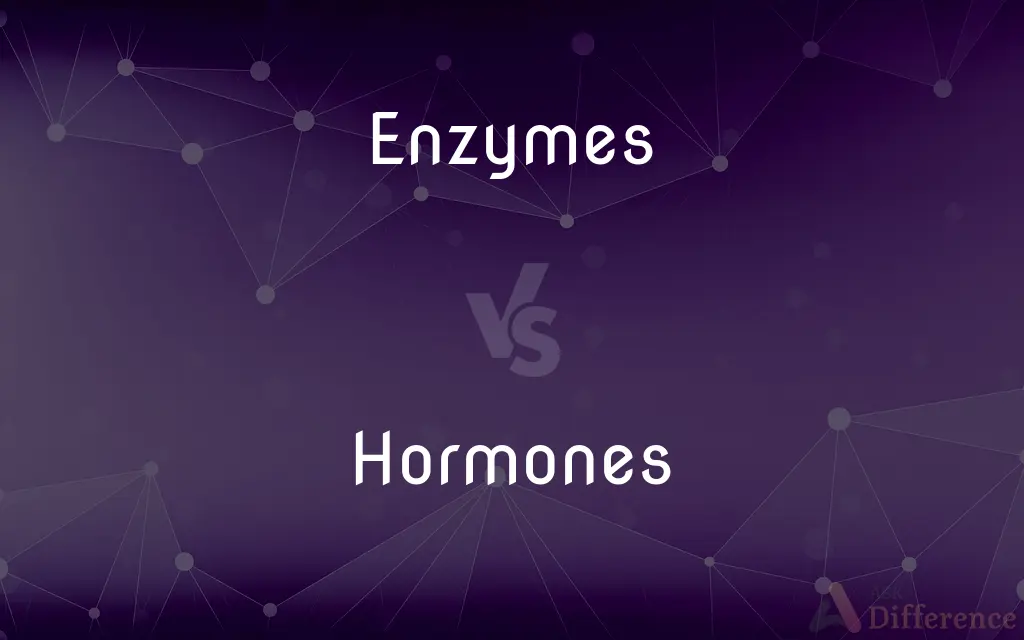Enzymes vs. Hormones — What's the Difference?
By Tayyaba Rehman — Published on January 13, 2024
Enzymes are biological catalysts speeding up reactions, while hormones are chemical messengers coordinating bodily functions.

Difference Between Enzymes and Hormones
Table of Contents
ADVERTISEMENT
Key Differences
Enzymes and hormones play essential roles in the human body but function differently. Enzymes are proteins that catalyze biochemical reactions, making them proceed at a faster rate without being consumed in the process. Hormones, on the other hand, are chemical substances produced in glands and transported in the bloodstream to signal organs and regulate physiology. While enzymes are directly involved in chemical transformations, hormones serve as communication signals that affect the activity of cells and tissues.
Both enzymes and hormones are crucial to life, but their mechanisms of action contrast sharply. Enzymes act at the site where they are produced or where they are sent within the cell, often in immediate response to the need for a specific reaction. Hormones may have effects far from their site of production and often modulate processes over a longer duration, such as growth, metabolism, and reproduction. Enzymes work by lowering the activation energy of reactions, enabling metabolism to occur efficiently. Hormones, however, work by binding to specific receptors, initiating a response such as the expression of certain genes or the activation of other enzymes.
Despite being vital biomolecules, enzymes and hormones differ significantly in their structure and diversity. Enzymes are typically larger and more complex proteins with specific active sites for their substrate molecules. In contrast, hormones can be proteins, peptides, or derivatives of amino acids and lipids, with simpler structures for their function as signaling molecules. Enzymes are often highly specific, interacting only with their particular substrates, whereas hormones can influence a wide range of systems and processes depending on their target receptors.
The role of enzymes extends to nearly every chemical reaction in an organism, from digestion to DNA replication. Hormones, conversely, have roles primarily in communication and regulation, controlling everything from blood sugar levels to the sleep cycle. Enzymes are indispensable for the immediate functionality of cellular processes, while hormones are integral to maintaining homeostasis and orchestrating complex bodily functions over time.
In terms of regulation, enzymes are often regulated by factors within the cell, including the presence of inhibitors or activators, and the amounts of substrates available. Hormones are typically regulated by complex feedback mechanisms involving the endocrine system. Enzymes can be upregulated or downregulated based on cellular needs, while hormone levels are controlled to keep the internal environment of the body stable, often in response to external stimuli or internal cues.
ADVERTISEMENT
Comparison Chart
Primary Function
Catalyze biochemical reactions
Act as chemical messengers
Nature
Proteins with specific active sites
Can be proteins, peptides, or other molecules
Location of Action
Often act locally within cells
Act on target cells, often distant
Role in Homeostasis
Direct involvement in metabolic processes
Regulate and coordinate bodily functions
Mechanism of Action
Lower activation energy for reactions
Bind to receptors to initiate responses
Production and Secretion
Produced by cells where needed, not secreted
Produced by glands, secreted into bloodstream
Speed of Action
Act immediately on substrates
May have immediate or long-term effects
Compare with Definitions
Enzymes
Substances that lower the energy threshold for reactions to proceed.
The enzyme catalase rapidly converts hydrogen peroxide into water and oxygen.
Hormones
Involved in growth, reproduction, and homeostasis.
Growth hormone stimulates tissue growth and repair.
Enzymes
Proteins that facilitate specific chemical processes without being consumed.
Salivary amylase enzyme initiates the digestion of starch in the mouth.
Hormones
Secreted by endocrine glands into the bloodstream.
The thyroid gland secretes the hormone thyroxine, which regulates metabolism.
Enzymes
Crucial components in metabolic pathways within organisms.
The enzyme rubisco is essential for carbon fixation during photosynthesis.
Hormones
Can have widespread effects on various organ systems.
Cortisol, a stress hormone, affects immune response and metabolism.
Enzymes
Biological catalysts that accelerate chemical reactions.
The enzyme lactase breaks down lactose into glucose and galactose.
Hormones
Typically have longer-lasting effects than enzymatic actions.
Estrogen influences the development of secondary sexual characteristics over years.
Enzymes
Regulated by cellular conditions to maintain metabolic balance.
Enzyme activity in the citric acid cycle is tightly regulated to meet energy demands.
Hormones
Chemical signals that regulate physiological functions.
The hormone insulin helps regulate blood glucose levels.
Enzymes
Any of numerous compounds that are produced by living organisms and function as biochemical catalysts. Some enzymes are simple proteins, and others consist of a protein linked to one or more nonprotein groups.
Hormones
A substance, usually a peptide or steroid, produced by one tissue and conveyed by the bloodstream to another to effect physiological activity, such as growth or metabolism.
Enzymes
Plural of enzyme
Hormones
A synthetic compound that acts like a hormone in the body.
Hormones
Any of various similar substances found in plants and insects that regulate development.
Hormones
Hormone replacement therapy.
If the doctor gives the OK, I should be able to start hormones by the end of the month.
Hormones
Plural of hormone
Common Curiosities
Are enzymes specific to their substrates?
Yes, most enzymes are highly specific, interacting only with particular substrate molecules.
What are enzymes?
Enzymes are proteins that act as catalysts to speed up biochemical reactions.
How do hormones exert their effects?
Hormones exert their effects by binding to specific receptors on target cells.
Can enzymes be inhibited?
Yes, enzymes can be inhibited by certain molecules that decrease their activity.
Can one hormone affect multiple parts of the body?
Yes, since hormones circulate in the bloodstream, they can affect various organs and tissues.
Where do enzymes function?
Enzymes function within the cells where they are produced or in the local environment around the cells.
Can hormones be taken as medication?
Yes, hormones like insulin are administered as medication to treat certain conditions.
How do enzymes work?
Enzymes work by lowering the activation energy of a reaction, allowing it to occur more quickly.
Where are hormones produced?
Hormones are produced by endocrine glands and are released into the bloodstream.
What are hormones?
Hormones are chemical messengers that signal and regulate bodily functions.
Are enzymes found outside of living organisms?
Enzymes are typically not active outside of living organisms, except when extracted for industrial or research purposes.
How are enzyme levels regulated?
Enzyme levels are regulated by cellular mechanisms, including gene expression and feedback from their end products.
Do enzymes have a role in digestion?
Yes, enzymes such as amylase and protease play a crucial role in the digestion of food.
How are hormone levels regulated?
Hormone levels are regulated by feedback mechanisms involving the endocrine system.
Are hormones always proteins?
No, hormones can be proteins, peptides, or derived from amino acids and lipids.
Share Your Discovery

Previous Comparison
Log vs. Ln
Next Comparison
Squamous Epithelium vs. Columnar EpitheliumAuthor Spotlight
Written by
Tayyaba RehmanTayyaba Rehman is a distinguished writer, currently serving as a primary contributor to askdifference.com. As a researcher in semantics and etymology, Tayyaba's passion for the complexity of languages and their distinctions has found a perfect home on the platform. Tayyaba delves into the intricacies of language, distinguishing between commonly confused words and phrases, thereby providing clarity for readers worldwide.
















































